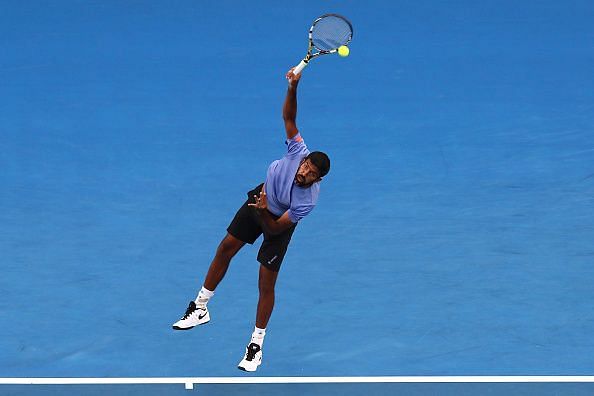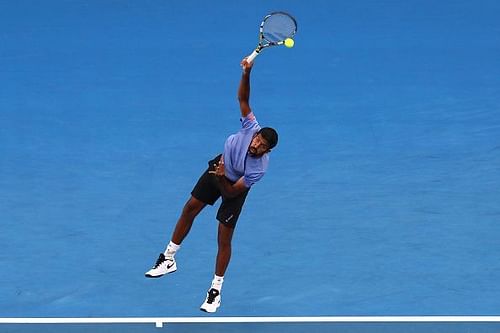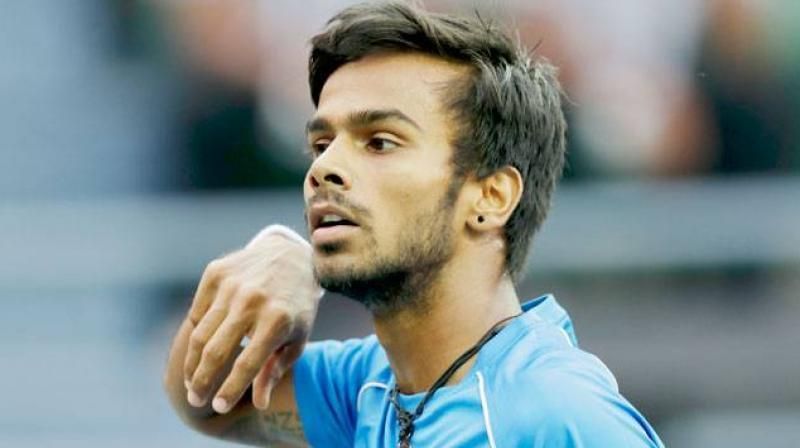
Indian tennis is slowly growing, says India's No. 1 doubles player Rohan Bopanna

Ever since turning pro in 2003, Indian tennis sensation Rohan Bopanna's career has been moving upwards. At the age of 37, he just seems to be getting better with age.
He first made headlines when he partnered with Pakistan tennis star Aisam-ul-Haq Qureshi back in 2007. The duo, named the Indo-Pak express, achieved a lot of success in 2010, when they reached the quarterfinals at Wimbledon and finished runners-up in the US Open.
Since then, he has won a total of 16 doubles titles with different partners over the past seven years. His consistency at the Grand Slam level paid off when he won the Roland Garros title in 2017 along with his partner Gabriela Dabrowski in the mixed doubles event.
Despite not winning a Grand Slam in men's doubles yet, Bopanna has achieved significant success in the event. He reached the finals of the World Tour Finals on two separate occasions, with Mahesh Bhupathi and Florin Mergea respectively.
He has also been a key contributor to the success and development of Indian tennis. He has been an integral of the Davis Cup squad for many years now and has carried the team on his shoulders on a number of occasions.
By opening a tennis academy of his own in Bangalore, he has also helped promote the sport in India by guiding a lot of youngsters.
Currently, he is the only Indian remaining in the Australian Open, in the mixed doubles event, along with his partner Timea Babos.
Sportskeeda caught up with the 37-year-old after his 2nd round victory.
Here are a few excerpts from the interview:
Q. How do you adapt to the heat in Melbourne? Do you make any changes to your game?
One of the reasons why we come in early to Melbourne is to get prepared. We always know it is very hot here and last week I was in Sydney and it was hot there as well. That helps us get used to it. We don't play points differently as such. The night before, we make sure that we have a lot of fluids to keep ourselves hydrated, which is a key element I think in the heat.
It helps having a trainer, physio, anybody traveling with you non-stop to make sure you are doing the right stuff. Before and after matches you go into the ice bath, cool down and get well prepared for the next day. These are the few things every player does over the years, which becomes a part of your routine. It's not really something new that you try to do.
Q. You have had a number of partners over the past couple of years. Any reason for the constant change?
When I spoke to Pablo Cuevas last year, we had fixed basically one year to see how we can do. I thought every tournament we played, we played very well. Unfortunately, Pablo got hurt in between and he had to miss a few tournaments so I had to change a lot of partners. We were pretty close to qualifying for London but unfortunately, we didn't play the big tournaments together so we were about 1200 points away from qualifying.
Also, one of the reasons I wanted to change this year was to try to get a partner who only plays doubles because that helps. Last year when I played with Pablo we didn't have a practice set as such. I got along very well with him and we played well together but eventually, I think sometimes it is good to practice with that person as that would help a lot.
So, I thought let's try and find somebody this year who I could play full-time doubles with. Edouard Roger-Vasselin was someone who has moved from singles to playing only doubles now so I thought he would be a good partner for me. We played pretty well together back in 2013 and we said you know what let's try and see how it goes.
So far we have been enjoying ourselves and we had three good matches in Sydney and a couple of matches here, so we are looking forward to the next few matches.
Q. What are your aims and expectations for this year? Is it London?
Obviously London. You want to do well as a team and London is very much the goal. Doing well in Masters series and Grand Slams is the key. If you do well in that, you are automatically going to be qualifying for London. Of course, not just to qualify but also do well once you get there. I have reached the final there twice and obviously if I go there again, the aim is to try and win that. Every team out there who starts off the year wants to do well and qualify for the World Tour Final.
Q. Who do you think you've had the best chemistry with over the years?
I think when I started off at the Challengers then moving into the Grand Slams, it was Qureshi for a long, long time and after that, I played with Mahesh, who is very experienced and for me, I learnt a lot from him. Over the years, Qureshi and I had a great breakthrough and we came together and our chemistry was good. We were playing well together and when I played with Mahesh, like I said, I learnt a lot. He has already achieved so much. So even playing a big tournament, a big event, he was already there at that level and had been there before.
Q. Yuki Bhambri and Ramkumar Ramanathan have constantly spoken about the need for a personal trainer to travel along with them. However, they have not received enough funding and backing for the same. What are your thoughts on this?
I think the support team is a very, very important part of any professional sport. Ram and Yuki, they totally deserve to have a coach and trainer traveling full-time and that will not harm them in any way. That will only help them get better and improve their game.
Funding and backing, wherever it comes from, whether it is the federation, private sponsors or the government, at the end of the day you have to look at it, whoever is doing it, is doing it as a team. This person is going to benefit, wherever it comes from irrespective of whether it is all three pitching in and saying, 'Yuki, Ram, here is some support.'
Even for me, I am paying for my own coach, my own trainer. At the end of the day, those are the necessities I need as a tennis player. I need them here to watch matches, give me feedback constantly. After the match, to stretch, to recover, to have the physio, to have the trainer, these are part of the team. I think everyone from the No. 1 tennis player in the world to someone who is just starting off, the team behind them makes them. Not only the individual himself.
Q. What is the need of the hour for tennis in India?
In March, it will be two years since I started a tennis academy. Now I see a lot of youngsters there and what is required is someone really planning their calendar, planning what tournaments to do, how many weeks to travel. These are the things that have to start from the age of 7.
Just giving them a structure in place, a program in place, so right now when they come into the academy, there are certain kids who are 17 or 18 but have never played an ITF Men's tournament. Where they come from, I don't know if somebody has told them to just keep training and not play tournaments, but these are the things which have to be programmed in a structural way.
Q. Your thoughts on the young tennis stars from India.

As a junior, in Pune, Sumit was playing excellently. I think he has good potential to go up and do well and right now in the Davis Cup teams, there are a few good guys. Mahesh has a good opportunity as captain, having Yuki, Ram, Prajnnesh, Saket, Sumit, and a lot of other guys to choose from, which makes it a good atmosphere and a team to be in. They are pushing each other, which makes them want to get better constantly.
That's the beauty of it, Indian tennis is slowly growing and with support, we'll have more and more players coming up.
Q. As a doubles player, do you find it unfair that the singles players get priority to play on the bigger courts, like Rod Laver Arena and Margaret Court Arena?
That's up to the tournament organizers, I don't really think we have a say in it. Of course, every player would love to play in the biggest court and in front of huge crowds but of course, the tournament chooses which court and if doubles players get to play in the big courts, it's obviously fantastic. There is nothing like it. Because it is your main sport and you are playing in the biggest arena, so it is the best feeling.
Q. What are the favourite moments from your tennis career so far?
A couple of ones, first, representing India in the Davis Cup. Just representing the country is always a huge thing and no doubt, winning my first Grand Slam, can't beat that. These are the few moments that will always be with me irrespective of how long I play.